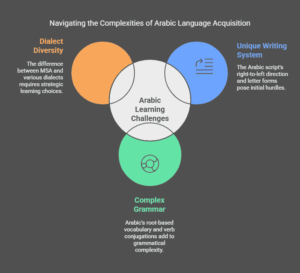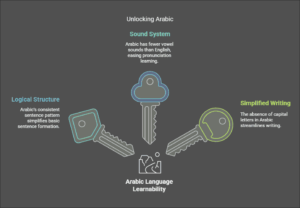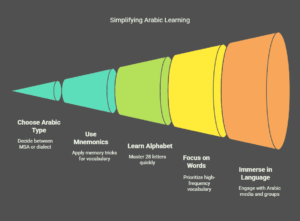Arabic is a rich, ancient language spoken by over 400 million people worldwide. Many learners wonder, “Is Arabic hard to learn?” While Arabic has unique challenges, it is not impossible to master with the right approach, tools, and mindset.
This guide will break down:
✅ Why Arabic is considered challenging.
✅ How to make learning easier with proven strategies.
✅ The best methods for mastering Arabic.
Let’s explore whether Arabic is hard to learn and how you can become fluent step by step!
Why Do People Think Arabic Is Hard to Learn?

1. Unique Writing System
✅ Arabic script is written from right to left, unlike English.
✅ The 28 letters have four different forms depending on their position in a word.
✅ Diacritics (small marks) indicate vowel sounds, making pronunciation tricky.
💡 Tip: Learn the Arabic alphabet first before diving into grammar.
2. Complex Grammar
✅ Root-based system – Arabic words come from three-letter roots that change with prefixes and suffixes.
✅ Verb conjugations – Arabic verbs change based on tense, gender, and person.
✅ Dual form – Unlike English, Arabic has a special form for two people or things.
💡 Tip: Focus on learning basic sentence structures first before worrying about advanced grammar.
3. Arabic Dialects vs. Modern Standard Arabic (MSA)
✅ MSA (Fusha) – Used in books, newspapers, and formal settings.
✅ Dialects – Spoken in daily conversations, different across countries.
💡 Tip: Decide whether you want to learn MSA or a dialect based on your goals.
Why Arabic Is Not as Hard as You Think

1. Logical Sentence Structure
Unlike English, Arabic follows a consistent pattern:
🔹 Verb – Subject – Object (e.g., “Ate the boy an apple”).
This structure stays the same in most sentences, making it easy to form basic sentences.
2. Limited Sounds to Learn
Arabic has some sounds that are absent from English (ع, خ, ق), but it has fewer vowel sounds than English.
💡 Tip: Listening practice will help you master these unique sounds faster.
3. No Capital Letters or Irregular Plurals
Unlike English, Arabic doesn’t use capital letters, making writing more straightforward.
💡 Tip: Focus on learning Arabic plurals, as they follow a predictable pattern.
How to Make Learning Arabic Easier

1. Choose the Right Type of Arabic
✅ Want to read books and news? → Learn Modern Standard Arabic (MSA).
✅ Want to talk to locals? → Learn a spoken dialect (e.g., Egyptian or Levantine).
💡 Tip: Start with MSA and pick a dialect later if needed.
2. Use Mnemonics and Memory Tricks
🔹 Example: The word “كتاب” (kitab) means “book” – Think of a “kit” that has books in it.
💡 Tip: Create funny or visual associations to remember new words easily.
3. Learn the Arabic Alphabet in 1 Week
🚀 Arabic has only 28 letters – You can learn them in one week with consistent practice!
💡 Tip: Use flashcards and writing practice to memorize the letters quickly.
4. Focus on High-Frequency Words
Did you know? 100 common words make up 50% of daily conversations!
💡 Tip: Learn common greetings, question words, and verbs first.
5. Immerse Yourself in Arabic
🔹 Watch Arabic TV shows or YouTube videos.
🔹 Listen to Arabic music and audiobooks.
🔹 Join online Arabic-speaking groups.
💡 Tip: The more you see and hear Arabic, the faster you’ll learn!
FAQs About Learning Arabic
1. How long does it take to learn Arabic?
📌 Basic conversation – 6 months
📌 Fluency in MSA – 1-2 years
📌 Mastery (reading books, speaking fluently) – 2-4 years
💡 Tip: Studying 30 minutes a day is better than 5 hours once a week.
2. Is Arabic harder than Chinese or Japanese?
🔹 Arabic is easier than Chinese or Japanese because it shares more vocabulary with English.
💡 Tip: Focus on similar words between Arabic and English (e.g., “Algebra” = الجبر).
3. Can I learn Arabic online for free?
Yes! There are many free resources:
✅ Duolingo, Memrise, Anki (for vocabulary)
✅ YouTube channels like ArabicPod101
✅ Quran Courses Academy (for structured lessons)
4. Should I learn Quranic Arabic first?
If your goal is to understand the Quran, then learning Quranic Arabic is best. Otherwise, start with MSA or a spoken dialect.
💡 Tip: Learn basic Arabic first, then study Quranic Arabic gradually.
5. Is Arabic worth learning?
Absolutely! Arabic is:
🌍 Spoken in 20+ countries
📖 The language of the Quran
💼 Useful for business and careers
💡 Tip: Learning Arabic opens doors to new cultures, careers, and personal growth.
Conclusion: Is Arabic Hard to Learn?
🚀 Arabic may seem challenging at first, but with the right approach, anyone can learn it!
💡 Key Takeaways:
✅ Learn the Arabic alphabet first.
✅ Focus on high-frequency words.
✅ Choose between MSA or a dialect.
✅ Use immersion techniques (music, TV, books).
✅ Practice daily – Consistency is key!
📌 Want to start learning Arabic?
Join our Quran Courses Academy and get 2 FREE trial Arabic classes today! 🎉
📖 May Allah bless your journey in learning Arabic! 🤲



